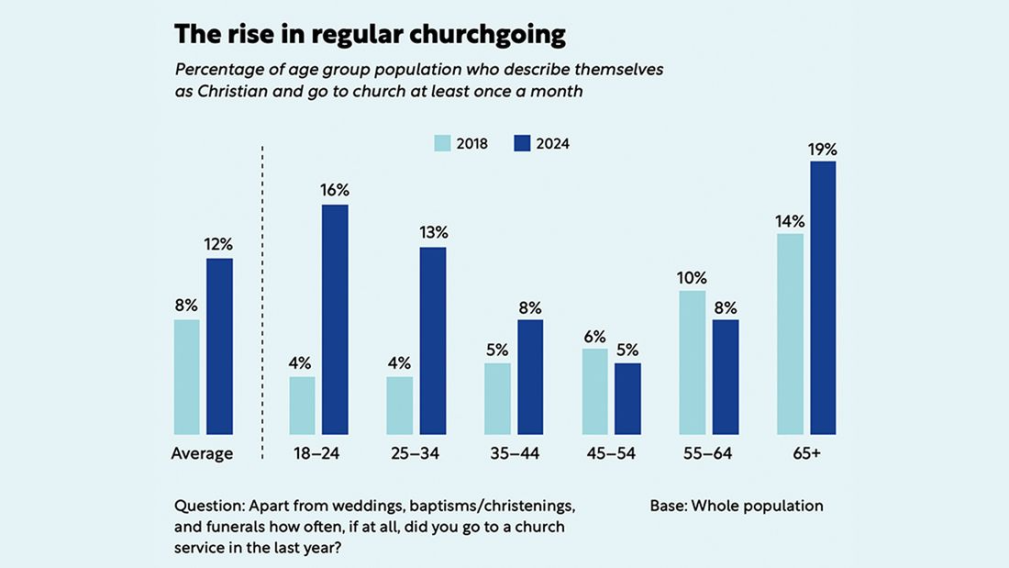Church attendance in the United Kingdom is seeing a dramatic resurgence, particularly among young adults, according to new findings published by Bible Society UK. The report, The Quiet Revival, reveals that over two million more people are now attending church than six years ago—a 50% increase in attendance that challenges longstanding narratives of Christian decline.
The research, conducted by Bible Society and YouGov, highlights the most significant growth among 18–24-year-olds. In 2018, only 4% of this age group reported attending church at least monthly. That figure has since quadrupled to 16%. Among young men, attendance jumped from 4% to 21%, while young women saw an increase from 3% to 12%.

The also study found the Church is becoming more ethnically diverse, especially among younger groups. Around one-third (32%) of churchgoers under 55 are from non-White backgrounds, compared to just 6% among those over 55. This younger demographic is more ethnically diverse than the general population, where 18% identified as non-White in the 2021 census. Notably, nearly half (47%) of young Black people aged 18–34 attend church monthly, and one-third (33%) of 18–34-year-olds from mixed ethnic backgrounds are also regular churchgoers.
The rise in church attendance is not only due to increased participation from minority ethnic groups; White attendance is also on the rise. For example, 18% of 18–34-year-old White men now attend church monthly, a figure that has quadrupled from just 3% in 2018. A similar, though less pronounced, trend is observed among young White women. This demonstrates an overall increase in churchgoing among young adults, with notable growth from the White population.
“These are striking findings that completely reverse the widely held assumption that the Church in England and Wales is in terminal decline,” said Dr. Rhiannon McAleer, co-author of the report.
Young adults today are not just attending church—they are becoming the most religiously engaged generation alive. The data shows a rise in Bible reading and belief in God among 18–24-year-olds, marking a shift from passive identification to active faith.
Beyond attendance figures, the report notes broader social benefits tied to church involvement. More than 60% of churchgoing Christians say they feel a strong sense of belonging in their local community—compared to just 25% of non-churchgoers.
Church involvement is strongly correlated with improved mental and emotional well-being—particularly among young adults. At a time when this generation faces a growing mental health crisis, active faith participation appears to offer significant support and stability.
Researchers suggest the real decline is not in Christianity itself, but in nominal Christianity—where people identify as Christians culturally, but do not actively participate in church life or mission.
These findings are based on a nationally representative longitudinal study tracking religious attitudes and behaviour across England and Wales since 2018. The data, commissioned by Bible Society and conducted by YouGov, offers the most comprehensive look at the Church’s trajectory in years.
Speaking with Caldron Pool, Reverend Brett Murphy of Emmanuel Church, in Morecambe Lancashire, described the United Kingdom’s recent past as a “spiritual wasteland” marked by decades of decline in Christian attendance and a corresponding rise in radical secularism.
“Radical secular leftism has weakened the Christian foundations of our culture to the extent that aspects of British culture many Britons take for granted are dissolving before their very eyes,” Rev. Murphy said, adding that for over forty years, much of the church—particularly the Protestant denominations—has “capitulated to the prevailing leftist cultural zeitgeist.”
Rev. Murphy cited widespread biblical revisionism and theological compromise as contributing factors in the collapse of church attendance across the country. According to recent reports, over 3,000 churches have either closed or are now rarely used within the past decade.
On top of this, Rev, Murphy noted that Britain has simultaneously seen “almost uncontrolled levels of Islamic migration.” Despite the bleak outlook, he pointed to the findings as signs of hope: “In the midst of this darkness, there is a glimmer of light, a reminder that Almighty God has preserved a remnant and is building His church.”
“Young men, and to a lesser extent young women, are attending predominantly traditionalist churches, avoiding the woke denominations almost entirely,” Rev. Murphy said. “This confirms a hunch I’ve had for a few years. The younger generations are fed up with the shallow vapid lies of wokeism and are yearning for a belief system of substance.”
According to Murphy, many young people are disillusioned with the country’s trajectory and are turning back to historic Christianity as a source of cultural and spiritual strength. “We have attracted people from all walks of life,” he said of his own independent, traditionalist Anglican congregation. “A large percentage are young men searching for a community of Christians who stand firm on God’s word.
“Let’s hope and pray that the survey results from Bible Society and YouGov are good signs of a revival beginning to break out in the Green and Pleasant Land,” he said.






















You must be logged in to post a comment.